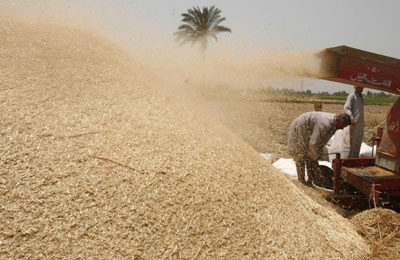
Egypt insists food supply secure
Cairo, February 25, 2013
Egypt's wheat imports are sharply down this year as it endures economic and political crisis, but state and private buyers insist they still have funds to keep the nation supplied with its staple bread.
Egyptian officials and traders acknowledge the government's problems with a rising budget deficit and falling currency reserves, but say the state is allocating priority financing for wheat imports. They are also pinning some of their hopes on an increase in domestic production.
Foreign traders and financiers remain sceptical, pointing to a big drop both in wheat stocks - to about three months' supply from over seven last October - and in the number of grains ships arriving at Egyptian ports.
This, they believe, is evidence that the state grains supplier, the General Authority for Supply Commodities, (GASC) is facing problems in maintaining imports.
"It's an ongoing concern that the political and economic turmoil is making it a challenge for GASC to import wheat," said Karel Valken, global head of trade and commodity finance at Rabobank.
Egypt has a history of bread riots but maintained supplies of heavily subsidised flat loaves - which sell to the poor for just 5 piastres (less than 1 US cent) - throughout the popular uprising that overthrew president Hosni Mubarak in 2011.
The man who until last week organised Egypt's state wheat purchases, Nomani Nomani, dismissed any suggestion that the government had failed to produce promised funding or guarantees to ensure that shipments could go ahead.
"The state has not at any point reduced its payments or failed to deliver to us financial guarantees," Nomani, who now advises the supply minister, told Reuters on Sunday. As vice chairman of GASC, Nomani was arguably the most powerful man on the global wheat market as Egypt is traditionally the world's biggest importer of the grain.
President Mohamed Mursi's government faces daunting economic problems. The Egyptian pound has fallen more than 8 percent since the start of January, and foreign currency reserves have tumbled to $13.6 billon in January from $36 billion before the fall of Mubarak.
A HEAVY STRAIN
The pound's drop is putting a heavy strain on the government budget as it has pushed up the cost of state subsidies on energy and food, much of which is purchased in dollars.
At the same time detailed negotiations for a $4.8 billion loan from the International Monetary Fund have yet to get underway, and Egyptian politics are in turmoil due to disputes between the ruling Islamists and opposition parties over a new constitution and parliamentary elections due to start in April.
Nevertheless, private traders discount talk of delivery disruptions, payments problems or shortages so far.
"If you're asking about any delays in shipping schedules due to contractual liability performance on GASC's side due to a shortage of foreign currency, the answer as of today, as we speak, is no," said Hassan Abdel Fadil, chief executive of Egyptian trader Venus.
"There is a good local supply, both on the private side and on the GASC side. People keep talking about shortage of stocks - no, it's not true, neither on the private nor on the GASC side."
Nevertheless, the figures are striking. GASC has bought 235,000 tonnes of wheat since Jan. 1, about a third of what it purchased in the same period a year earlier. - Reuters







